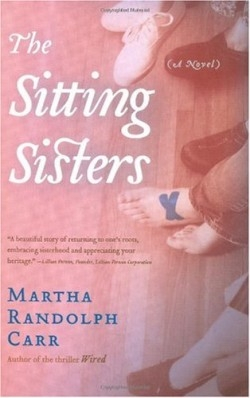The Sitting Sisters
If home is where the heart is and love is blind, then many are left wandering. Such could be said of Tollie Ervin, the protagonist of the author’s second novel, about four thirty-something siblings who reunite after years of estrangement in their hometown of Kelsal, South Carolina. The sisters must once again lean on each other when they discover that their father, the local minister, is dying of AIDS. Hurt and confused, they struggle to keep the news a secret from the close-knit island community while deeper secrets surface at home. Soon Tollie learns that the sisters she remembers as girls are very different from the women standing before her now, each with conflicting memories of their shared youth and a different axe to grind.
Carr, a native Virginian, is no stranger to the subtleties of Southern life. Born into a family of respected statesmen including Thomas Jefferson and Lord Delaware, the author traded in her career as a stockbroker for work as a freelance writer. She has since published a novel, the thriller Wired, and has written for The Washington Post. Her third novel, which is still in progress, will be the first in a series of thrillers.
For all its soul, The Sitting Sisters is somewhat uneven. Much of the prose in the first half of the book feels choppy and the action is often difficult to follow. As the story progresses, Carr finds a steadier rhythm and is at her best in scenes between the sisters. Still, with few glimpses into the past, readers may have trouble understanding the roots of Tollie’s familial resentments. To Carr’s credit, the same holes that leave some relationships lacking also bolster her themes. For example, as Tollie tries to reconnect with her family, she discovers that a set of disaffected cousins lives only miles away. The relative mystery that surrounds the sisters’ early years makes Tollie’s new information more easily acceptable. While readers are less able to experience the pain of discovery with her, they are also better equipped to appreciate how these secrets have shaped the identity of the community as a whole.
Those who have experienced a family illness will relate to Tollie’s mixed emotions of guilt and repulsion, and her frustration as hopes are raised, dashed, and raised again. Fans of Southern literature, too, should find familiar territory in Kelsal, where gossip is a communal pastime and racial tensions abound. In the end, The Sitting Sisters offers insights for anyone who has ever returned home and wondered, as Tollie does, “Was I ever a part of this place or did I give up something that wasn’t mine in the first place?”
Reviewed by
Aimee Sabo
Disclosure: This article is not an endorsement, but a review. The publisher of this book provided free copies of the book to have their book reviewed by a professional reviewer. No fee was paid by the publisher for this review. Foreword Reviews only recommends books that we love. Foreword Magazine, Inc. is disclosing this in accordance with the Federal Trade Commission’s 16 CFR, Part 255.

